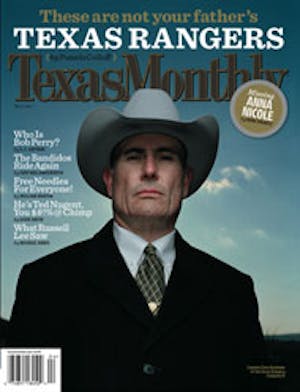NAME: Lucian Read | AGE: 32 | HOMETOWN: Austin | QUALIFICATIONS: Freelance photographer in Iraq since 2004 / Has been published in Newsweek, Time, Vanity Fair, the New York Times, and Paris Match, among others / Winner of a 2006 World Press Photo Award
• When I got to Fallujah in 2004, my primary aim was photographing combat. Those pictures are necessarily heroic: the brave American fighting man, a steely-eyed warrior wreathed in gunfire smoke. There’s truth in those images, but also a mythology. They aren’t the whole story.
• The guys I’m with ask, “If I get hurt, are you going to photograph that?” I say, “Yeah. A picture of war with no one getting hurt is a cartoon.”
• In journalism school, at San Francisco State University, the most compelling pictures, the ones quietly pushed as the most important, were from the guys shooting wars, the Larry Burrowses, the Jim Nachtweys, the David Douglas Duncans.
• In 2005 I was embedded with a Marine company in Haditha. I wasn’t there the day the 24 people were killed [in the Haditha massacre], but I went out with a foot patrol to the same area two days later. Two English-speaking Iraqis asked me to come inside a home. All the bodies had been returned from the morgue and were laid out and shrouded. It was like a wake, and the men were not hostile or accusatory. They just asked me to take photographs. And they asked how to keep this from happening again.
• I sent those photos back to the world, to New York, but nobody said anything for three months. I had no idea that what had happened might be any more horrible than the daily horror of the place. Twenty-four deaths in one day in Baghdad is a good day.
• I’d taken portraits of all the Marines in the company a month or two before, because photos are such lifelines for families. They were meant to be like Civil War photos that get passed down through generations, but now they’re being used to condemn some of these guys. They have gone from being heirlooms to being mug shots.
• I say I’ve been scared one and a half times. The first was on patrol in Fallujah. It started raining and my camera shorted out. There was the usual going on, sounds of scattered gunfire, whatever. While I was shooting, I had a job, I was preoccupied. Once I lost my camera, I was just a guy, a civilian standing in battle, a target. I felt a palpable anxiety. It lasted about fifteen minutes, until another photographer loaned me his second camera. Then I went back to work.
• The other time I was scared, the half a time, was with the surgeons at Camp Ramadi, seeing injuries clinically and deliberately— guys with legs amputated, badly burned. Typically I’d see those injuries in a firefight, on the street, at night, the guys still in their fatigues. Under the lights, on the operating table, they became terrifyingly real.
• When I shoot, I’m trying to help you understand the story I’m documenting. I have to find moments that impart the essential information and capture them as eloquently as possible.
• My father keeps telling me he wants me to find a new place to work.








